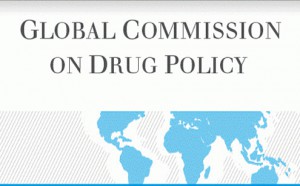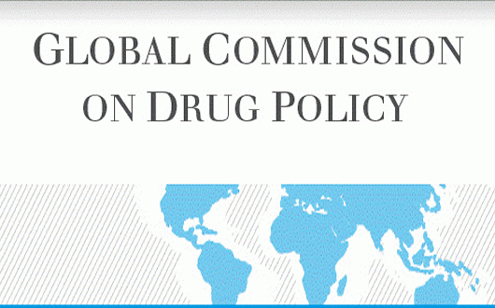 THUNDER BAY – Today the Global Commission on Drug Policy are releasing what they state is “a groundbreaking report”. The report will condemn the drug war as a failure and recommends major reforms of the global drug prohibition regime. The Commission is the most distinguished group of high-level leaders to ever call for such far-reaching changes – including not just alternatives to incarceration and greater emphasis on public health approaches to drug use but also decriminalization and experiments in legal regulation.
THUNDER BAY – Today the Global Commission on Drug Policy are releasing what they state is “a groundbreaking report”. The report will condemn the drug war as a failure and recommends major reforms of the global drug prohibition regime. The Commission is the most distinguished group of high-level leaders to ever call for such far-reaching changes – including not just alternatives to incarceration and greater emphasis on public health approaches to drug use but also decriminalization and experiments in legal regulation.
The Executive Director of the global advocacy organization AVAAZ, with its nine million members worldwide, will present a public petition in support of the Global Commission’s recommendations that will be given to the United Nations Secretary General. “Fifty years after the initiation of the UN Single Convention on Narcotic Drugs, and 40 years after President Nixon launched the US government’s global war on drugs, fundamental reforms in national and global drug control policies are urgently needed,” said former president of Brazil Fernando Henrique Cardoso. “Let’s start by treating drug addiction as a health issue, reducing drug demand through proven educational initiatives and legally regulating rather than criminalizing cannabis.”
The Commission’s recommendations include:
? End the criminalization, marginalization and stigmatization of people who use drugs but who do no harm to others.
? Encourage experimentation by governments with models of legal regulation of drugs (especially cannabis) to undermine the power of organized crime and
safeguard the health and security of their citizens.
? Ensure that a variety of treatment modalities are available – including not just methadone and buprenorphine treatment but also the heroin-assisted treatment programs that have proven successful in many European countries and Canada.
? Apply human rights and harm reduction principles and policies both to people who use drugs as well as those involved in the lower ends of illegal drug markets such as farmers, couriers and petty sellers.
“Overwhelming evidence from Europe, Canada and Australia now demonstrates the human and social benefits both of treating drug addiction as a health rather than criminal justice problem and of reducing reliance on prohibitionist policies,” said former Swiss president Ruth Dreifuss. “These policies need to be adopted worldwide, with requisite changes to the international drug control conventions.”
“We can no longer ignore the extent to which drug-related violence, crime and corruption in Latin America are the results of failed drug war policies,” said former Colombian president César Gaviria. “Now is the time to break the taboo on discussion of all drug policy options, including alternatives to drug prohibition.”
“The war on drugs has failed to cut drug usage, but has filled our jails, cost millions in tax payer dollars, fuelled organized crime and caused thousands of deaths. We need a new approach, one that takes the power out of the hands of organized crime and treats people with addiction problems like patients, not criminals,” said Richard Branson, founder of the Virgin Group and cofounder of The Elders, United Kingdom. “The good news is new approaches focused on regulation and decriminalization have worked. We need our leaders, including business people, looking at alternative, fact based approaches. We need more humane and effective ways to reduce the harm caused by drugs. The one thing we cannot afford to do is to go on pretending the “war on drugs” is working.”
The report’s Executive Summary states:
The global war on drugs has failed, with devastating consequences for individuals and societies around the world. Fifty years after the initiation of the UN Single Convention on Narcotic Drugs, and 40 years after President Nixon launched the US government’s war on drugs, fundamental reforms in national and global drug control policies are urgently needed.
Vast expenditures on criminalization and repressive measures directed at producers, traffickers and consumers of illegal drugs have clearly failed to effectively curtail supply or consumption. Apparent victories in eliminating one source or trafficking organization are negated almost instantly by the emergence of other sources and traffickers. Repressive efforts directed at consumers impede public health measures to reduce HIV/AIDS, overdose fatalities and other harmful consequences of drug use. Government expenditures on futile supply reduction strategies and incarceration displace more cost-effective and evidence-based investments in demand and harm
reduction.
Our principles and recommendations can be summarized as follows:
End the criminalization, marginalization and stigmatization of people who use drugs but who do no harm to others. Challenge rather than reinforce common misconceptions about drug markets, drug use and drug dependence. Encourage experimentation by governments with models of legal regulation of drugs to undermine the power of organized crime and safeguard the health and security of their citizens. This recommendation applies especially to cannabis, but we also encourage other experiments in decriminalization and legal regulation that can accomplish these objectives and provide models for others.
Offer health and treatment services to those in need. Ensure that a variety of treatment modalities are available, including not just methadone and buprenorphine treatment but also the heroin-assisted treatment programs that have proven successful in many European countries and Canada. Implement syringe access and other harm reduction measures that have proven effective in reducing transmission of HIV and other blood-borne infections as well as fatal overdoses. Respect the human rights of people who use drugs. Abolish abusive practices carried out in the name of treatment – such as forced detention, forced labor, and physical or psychological abuse – that contravene human rights standards and norms or that remove the right to self determination.
Apply much the same principles and policies stated above to people involved in the lower ends of illegal drug markets, such as farmers, couriers and petty sellers. Many are themselves victims of violence and intimidation or are drug dependent. Arresting and incarcerating tens of millions of these people in recent decades has filled prisons and destroyed lives and families without reducing the availability of illicit drugs or the power of criminal organizations.
There appears to be almost no limit to the number of people willing to engage in such activities to better their lives, provide for their families, or otherwise escape poverty. Drug control resources are better directed elsewhere. Invest in activities that can both prevent young people from taking drugs in the first place and also prevent those who do use drugs from developing more serious problems. Eschew simplistic ‘just say no’ messages and ‘zero tolerance’ policies in favor of educational efforts grounded in credible information and prevention programs that focus on social skills and peer influences.
The most successful prevention efforts may be those targeted at specific at-risk groups.
Focus repressive actions on violent criminal organizations, but do so in ways that undermine their power and reach while prioritizing the reduction of violence and intimidation. Law enforcement efforts should focus not on reducing drug markets per se but rather on reducing their harms to individuals, communities and national security.
Begin the transformation of the global drug prohibition regime. Replace drug policies and strategies driven by ideology and political convenience with fiscally responsible policies and strategies grounded in science, health, security and human rights – and adopt appropriate criteria for their evaluation.
Review the scheduling of drugs that has resulted in obvious anomalies like the flawed categorization of cannabis, coca leaf and MDMA. Ensure that the international conventions are interpreted and/or revised to accommodate robust experimentation with harm reduction, decriminalization and legal regulatory policies.
Break the taboo on debate and reform. The time for action is now.

